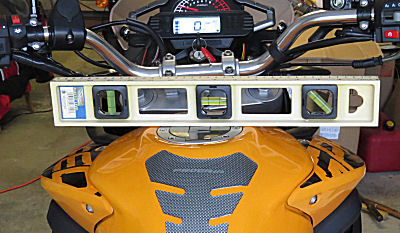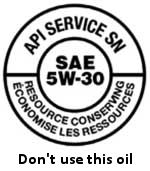The first thing to do is read the CSC tutorial on changing the oil and filter(s). That will give you 95% of the information you need to do the job. However there are a couple of points that they either skip over or don't mention.
- CSC say you can change the oil without removing the skid plate. This is true, you can change the oil. However if you want to change the oil, the filter and clean out the oil screens, unless you remove the skid plate it's going to get covered in oil. When the remove the oil filter or either of the oil screens, some oil will run out, even if you've first drained oil from the engine. This oil will run onto the top side of the skid plate and slowly drip though the holes in it. Unless you're nostalgic for British bikes of the 1960's you won't like your bike dripping oil.
- The oil screens are very slightly different in size at each end, as CSC mention. The size difference is very small and you really can't tell by looking at the screen. The way to tell is to insert each end into the cavity in the cover bolt. One end will go in easier than the other. This is the small end which CSC say should go into the bike. My bike had one screen installed that way around and one the other way around, so I don't know for sure who is right, but for now I'm sticking with CSC's recommendation.
- CSC say to fill the bike with oil up to the upper line on the sight window, which is correct. However they don't mention that when you start the bike up that level will go down because the oil fills up the new filter and maybe the screen filters. What you should do is fill it to the line, then run it for 10-15 seconds. Let it sit for 5 minutes and then top it up if the level has gone down (and it will have). That should do it, but it doesn't hurt to repeat the process of starting it up briefly and waiting 5 minutes just to check it again and make sure.

The level indication is very sensitive to the vertical angle of the bike. A few degrees off from straight up and there's a noticeable change in the oil level. What I did was to put a bubble level across the filler cap - and assume the fillet cap is level. Then rock the bike until the bubble level indicates the filler cap neck is horizontal. It helps to have someone to either hold the bike or look at the sight glass, since it's quite difficult for one person to do both. Doing it alone, a support jack in one side holding up the engine guard or skid plate can be used to adjust the angle and prevent the bike from tipping over when you raise it from the sidestand. If you have a centerstand, it makes like easier of course.
If you overfill it with oil, you may see some collecting in the crankcase breather tube on the left side of the bike. I don't know if the RX3 is the same as other bikes I've owned, but on them the best way to remove some oil was to thread a small tube down through the oil filler port and suck oil out. Trying to let a bit out by loosening the drain plug isn't the best way to do it.
Don't overtighten the drain plug. It's steel into threaded aluminum and if you overtighten it there's a change of stripping the threads. It's not holding anything together so it just needs to be tight enough not to come loose when vibrated by the engine. The same applies to the oil screen caps and the oil filter bolts.
I'd echo CSC's comment about not trying to to this with the RX3 "Tool Kit" that comes with the bike. Get a decent socket set. A 3/8" drive set is all you should require. Don't cheap out on this one. If there's a plastic handled tool in the set, you don't want it. What you want is a quality metric socket set that goes from at least 8mm to 19mm.
Which Oil to use?
 The choice of oil is a semi-religious thing, often depending as much on faith as on fact, with maybe a little superstition and tradition thrown in. There's a general rule for wet clutch bikes (the Cycline RX3 has a wet clutch) that you can use any oil that isn't labeled as "energy conserving". The conventional "wisdom" is that EC oils are too slippery and that causes the clutch to slip. While that's the truth, it's not quite the whole truth.
The choice of oil is a semi-religious thing, often depending as much on faith as on fact, with maybe a little superstition and tradition thrown in. There's a general rule for wet clutch bikes (the Cycline RX3 has a wet clutch) that you can use any oil that isn't labeled as "energy conserving". The conventional "wisdom" is that EC oils are too slippery and that causes the clutch to slip. While that's the truth, it's not quite the whole truth.
In some bikes you certainly can run some EC oils without a problem. Also some oils that do not have the EC marking may still contain friction modifiers, jut not enough to pass the tests required for an EC rating. The issue is which bikes and which oils. It's not just EC, but low viscosity (eg 0W-30) and EC that usually causes a problem. Higher viscosity oils (15W and up e.g. 15W-40) don't have EC rating and are less likely to bother wet clutches.
But why take the risk? One of the least expensive and thoroughly motorcycle tested oils is the Rotella T range from Shell. Primarily marketed as a diesel oil and with no mention of motorcycle use on the label, it doesn't have an EC rating (which doesn't mean it doesn't have any friction modifiers of course) and I don't recall anyone ever reporting clutch slip when using it. I've used it for years with no problems and it's used by many, many motorcycle riders. On top of that you can get it off the shelf at Walmart where it's typically under $15/gallon. The conventional oil, Rotella T, is rated 15W-40, plus there's a semi synthetic (T5, 10W-30) and fully synthetic (T6, 5W-40)option which are a few dollars more. Usual recommendation (again based partly on faith) is to run conventional oil during the break in period, then switch to synthetic after about 1000 or 2000 miles.
You can, of course, buy motorcycle oil which is marketed specifically for 4 stroke wet clutch motorcycle engines. It's probably very good, but tends to be expensive. For example you can expect to pay about $10/quart ($40/gallon) for Castrol Power RS Racing 4T 10W-40 Fully Synthetic Motorcycle Oil. For Amsoil you can expect to pay more, maybe $12.50/quart ($50/gallon). Maxima's Premium4 direct from CSC runs around $28/gallon. Depending on what mileage you put on the bike and how often you change your oil the added expense may or may not be significant.
There are factors other than viscosity which may matter, such as the amount of Phosphorus and Zinc additives (ZDDP) in the oil, which can affect valve wear. Modern auto oils tend to have reduced levels of these additives because they can cause problems with catalytic converters. Motorcycle specific oils may (usually) contain higher levels than (some) automobile oils. Whatever oil you pick the trick is to change it frequently. The frequency of change is probably more important than the brand of oil. How often should you change it? Well, every 2000 miles is a good interval. You probably don't need to change it more often than that expect during the break in period. If you don't ride the bike much then you should probably change it at least once a year. For those of us in the frozen north, just before the bike goes to sleep for the winter is a good time. There's moisture and acid in the old oil so changing it before winter rather than leaving it sitting in the engine over the winter is a good idea.
If you like to read about oil, I suggest this page Web Bike World Oil page.
If you want to know about extreme pressure/antiwear agents (EP/AW) like ZDDP (Zinc and Phosphorous) you should read http://www.fastexlubes.com/main.php?doc_id=257&cat_id=59.
If you want to get technical about what's printed on the label of your oil, oil for wet clutch transmissions (not necessarily bikes) should be rated under the JASO T 903:2006 standard as JASO MA, JASO MA1, JASO MA2 or JASO MB. In order to qualify an oil has also to be rated one of the following:
API SG, SH, SJ, SL, SM
ILSAC GF-1, GF-2, GF-3
ACEA A1/B1, A3/B3, A3/B4, A5/B5, C2, C3
Rotella T 15W-40 is rated JASO MA, as is Rotella T6 5W-40 synthetic. Note that Rotella T 10W-30 is not JASO rated even though it isn't marked as energy conserving. Rotella 5 15W-40 semi-synthetic is also not JASO rated, but it's not an energy conserving oil (no 15W-40 oil is), and higher viscosity so should be OK and a better bet than Rotella T 10W-30.
